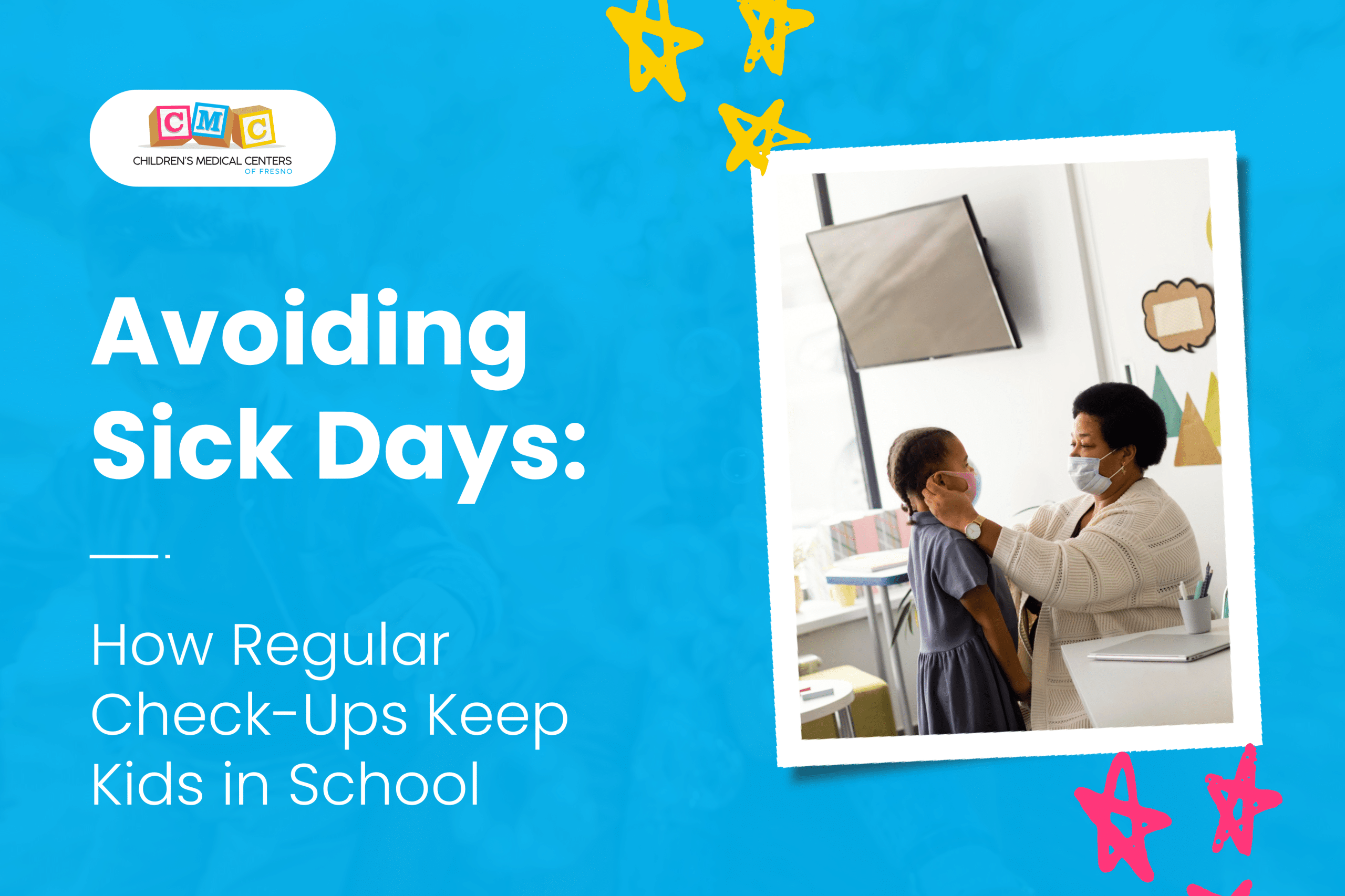Every parent’s goal is to see their child healthy, happy, and excelling at school. From homework help to after-school activities, parents do everything they can to support their children.
But the key to fewer sick days and better learning starts with something simple: routine checkups. When kids stay healthy, they’re more likely to stay on track academically. Conversely, chronic absenteeism in kindergarten can hurt a child’s ability to read and count proficiently by third grade.
By prioritizing your child’s well-being, you’re not just preventing an unexpected pediatric sick visit—you’re setting your child up for more opportunities to learn and grow.
Worried about Your Child’s Health?
The Importance of Early Detection
Regular check-ups not only keep your child fit today, but they can also help spot potential health issues early—issues that, if left unnoticed, could cause trouble down the line.
If your child often sneezes or has itchy eyes, it could be allergies. Check-ups help spot these early, allowing for treatments that prevent symptoms from affecting their school performance or daily activities. Your pediatrician can also guide you through crafting solutions for picky eaters or hormones if your child is about to enter puberty stage.
By detecting potential health issues in their initial stages, your child receives the care they need before problems escalate. This proactive approach not only keeps them healthier but also lowers the risk of more serious conditions later on.
When should your child have a pediatric check-up? The American Academy of Pediatrics (AAP) recommends consistently following this visit schedule:
Newborn to 2 Years
- Birth (Hospital Discharge): Initial assessment and screening.
- 3 to 5 Days Old: Follow-up visit to check weight, feeding, and health concerns.
- 2 Weeks: Weight check and physical exam.
- 1 Month: Physical exam and vaccinations if needed.
- 2 Months: Physical exam, growth assessment, and vaccinations.
- 4 Months: Physical exam, growth assessment, and vaccinations.
- 6 Months: Physical exam, growth assessment, and vaccinations, like pediatric flu shots.
- 9 Months: Physical exam, growth assessment, and finger stick for hemoglobin if needed.
- 12 Months: Physical exam, developmental milestones assessment, and vaccinations.
- 15 Months: Physical exam and vaccinations.
- 18 Months: Physical exam and vaccinations.
- 2 Years (24 Months): Physical exam and developmental screening.
2 to 5 Years
- 2.5 Years (30 Months): Physical exam and vaccinations, if needed.
- 3 Years: Annual check-up including physical exam and developmental screening.
- 4 Years: Annual check-up with vaccinations.
Continue checking in with your pediatrician for regular growth measurements, developmental assessments, and vision and hearing screenings for children aged five and older.
Keeping Vaccines Up-to-Date
Vaccinations prevent serious illnesses by preparing your child’s immune system to fight off infections before they have the chance to cause harm. By getting vaccinated, your child receives invisible protection from diseases or symptoms like pediatric fever that may lead to complications or a hospital stay.
Vaccines Your Child Needs and When to Get Them
- Hepatitis B (HepB): Given shortly after birth; follow-up doses at 1–2 months and 6–18 months.
- Diphtheria, Tetanus, and Pertussis (DTaP): Given at 2, 4, and 6 months; booster shots at 15–18 months and 4–6 years.
- Haemophilus Influenzae Type B (Hib): Scheduled for 2, 4, and 6 months; a final shot at 12–15 months.
- Polio (IPV): Administered at 2, 4, and 6–18 months; a booster at 4–6 years.
- Measles, Mumps, and Rubella (MMR): Given at 12–15 months; a second dose at 4–6 years.
- Varicella (Chickenpox): Administered at 12–15 months; a second dose at 4–6 years.
- Hepatitis A (HepA): Given at 12–23 months in two doses, 6 months apart.
- Pneumococcal (PCV13): Administered at 2, 4, 6, and 12–15 months.
- Meningococcal (MCV4): Given at 11–12 years; a booster at 16 years.
- Human Papillomavirus (HPV): Recommended at 11–12 years, typically in two doses (6–12 months apart).
- Influenza (Flu): Administered annually, starting at 6 months of age.
Sticking to the vaccination schedule helps keep your child healthy. Plan appointments in advance and set reminders on your phone or calendar. If you can, schedule multiple vaccinations or check-ups on the same day to save time.
And don’t overlook your telehealth options! Consider telemedicine for some follow-up discussions that your pediatrician can do virtually.
Building Long-Term Health

As mentioned, regular visits allow pediatricians to provide your child with preventive care and track developmental milestones. These sessions also enable your specialist to guide you in maintaining regular exercise, a balanced diet, and proper sleep—all building blocks for lifelong health.
These check-ups offer an ideal time for parents and pediatricians to collaborate on identifying the best care options for their children. Pediatricians can also provide referrals to trusted specialists in WIC programs, nutrition, and other medical fields.
From Developmental Milestones to School Attendance
Regular check-ups give parents reassurance that their child is progressing in motor skills, speech, and social development. This is particularly important when considering the broader context of school attendance.
According to recent data from the American Enterprise Institute, chronic absenteeism (missing 10% or more of school days in a year) remains a significant issue. In 2023–24, New Mexico made impressive strides by reducing its chronic absenteeism rate from 40% in the previous year to 33%. Colorado decreased chronic absenteeism by 3%, a smaller drop than the prior year.
These statistics tie directly into a powerful anecdote from NPR: Yolanda, a mother from Livingston, shared how she learned a painful lesson about absenteeism. Two years ago, when her daughter was in kindergarten, Yolanda allowed her daughter to miss school frequently—not due to illness, but simply because she didn’t want to go. Unfortunately, by the time her daughter reached first grade, she was struggling with reading and writing.
Yolanda and her daughter’s experience is a reminder of how even seemingly minor absenteeism can have long-lasting effects on a child’s academic success. This makes regular attendance and routine check-ups essential.
Making Check-Ups a Priority for Busy Parents
Life can get hectic, but keeping up with wellness appointments is an easy way to avoid bigger problems down the road. Regular checkups help your kid stay healthy and on track, plus they give you one less thing to worry about.
Here are some tips to help you stay on track with wellness visits:
Set annual appointments for the year. This way, you won’t have to scramble for appointments and can plan your family’s time more effectively.
Use pediatrician office reminders. Many pediatric offices send text or email reminders for upcoming appointments.
Take advantage of early morning or late afternoon slots. Booking during these off-peak hours can help avoid missing work or disrupting your day.
Stay proactive with a health checklist. Keep a list of your child’s immunizations, milestones, and any health concerns (like signs of the flu) to discuss during each visit.
Ensure a Sick-Free Year with Children’s Medical Centers of Fresno

Between work, school, and everything else, it’s not easy to keep your child healthy. Routine check-ups provide peace of mind by catching health issues early, reducing the risk of illness, and supporting your child’s academic success.
Schedule your child’s next wellness appointment today for a healthier, sick-free year! Contact us at 5043 E Cesar Chavez Boulevard at (559) 455-1500 or 805 Fresno Street at (559) 485-4000. We’re here to help your child stay on track!
When Your Child Is Sick,





